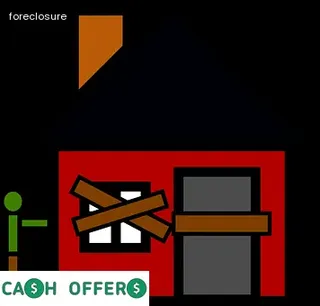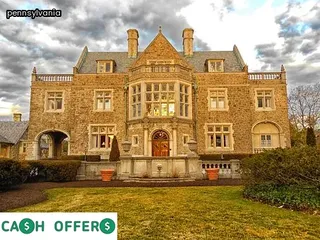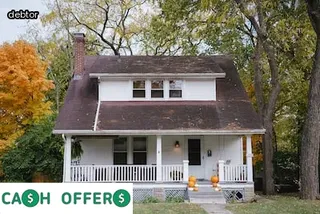Navigating the foreclosure process in Pennsylvania can be a daunting prospect for homeowners. Understanding the various processes involved is essential for successful navigation. Generally speaking, there are three main stages of foreclosure proceedings in Pennsylvania: pre-foreclosure, foreclosure auction, and post-foreclosure.
Pre-foreclosure begins when a mortgage lender notifies the homeowner that they are behind on payments and that their home will go into foreclosure unless the delinquent amount is paid in full. The lender must then file a complaint with the court to begin the foreclosure process. If this happens, a notice of sale must be published in two newspapers of general circulation in the county where the property is located.
During this stage, homeowners may reach out to their lenders to negotiate terms or sign up for alternative loan payment plans such as forbearance or loan modification programs. At the same time, homeowners should explore other options such as short sales or deed-in-lieu of foreclosure agreements with their lenders if necessary. The next step is the foreclosure auction where a third party bidder purchases the property from the lender at public auction if no buyer is found during pre-foreclosure.
If a buyer is found at this stage, they must pay off all debts associated with the property including back taxes and liens before taking ownership. Finally, after an unsuccessful auction sale, post-foreclosure proceedings take place whereby ownership of the home transfers to either another lender or back to its original owner if all debt obligations have been satisfied by this point. Homeowners should always consult with an attorney or financial advisor before proceeding through any phase of Pennsylvania's foreclosure process to ensure they fully understand their legal rights and responsibilities throughout each step.

When facing foreclosure, there are several strategies that Pennsylvania homeowners can use to avoid the process. One of the most important steps is to contact their lender as soon as possible and explain their financial situation in order to negotiate a repayment plan.
Homeowners should also consider refinancing their loan or pursuing a loan modification program if it is available. These two options can help to reduce monthly payments and make them more manageable for homeowners.
Additionally, some lenders may also agree to allow homeowners to sell their home for less than what they owe on it, which is known as a short sale. Finally, if all other options fail, filing for bankruptcy might be an option for those who qualify.
Navigating through all of these steps can be difficult, so it’s important for homeowners to understand the ins and outs of the Pennsylvania foreclosure process in order to make educated decisions that will benefit them in the long run.
Navigating the foreclosure process in Pennsylvania can be complex and daunting. It is important for homeowners to understand the procedures, timelines, and processes involved in order to protect their rights and maximize their options. In Pennsylvania, the majority of foreclosures are conducted through judicial proceedings.
This involves filing a complaint with a court and notifying the homeowner of the pending lawsuit. The court will then hold a hearing where both parties can present evidence before issuing a final decision. Once the homeowner has been served with notice of foreclosure, they have 20 days to respond or file an answer with the court.
Following this initial response, homeowners may decide to pursue various options such as loan modification or repayment plans that could potentially provide relief from foreclosure. Other alternatives may include voluntary surrender or short sale of the property instead of going through a full foreclosure process. Understanding all of these strategies can help homeowners make informed decisions about how best to proceed with their unique situation.
It is also important for homeowners to stay involved throughout the entire process and maintain communication with their lender or servicer in order to ensure that all laws are being followed and their rights are being respected. With proactive action, knowledge of applicable laws, and assistance from experienced legal professionals, Pennsylvania residents can navigate the challenging foreclosure process with confidence.

In Pennsylvania, a homeowner who goes through the foreclosure process may still be faced with a deficiency judgment. This is when the lender can pursue legal action to recover the remaining debt after selling the property.
The good news is that in Pennsylvania, lenders are limited in their ability to obtain such judgments. State law requires that lenders must file for a deficiency judgment within six months of the foreclosure sale and they must provide specific evidence of their claim.
In addition, any amount awarded through a deficiency judgment cannot exceed the difference between what was owed on the mortgage and what was obtained from selling the property at foreclosure. Homeowners should be aware of these regulations and also understand that there are other potential options available to them when it comes to settling or negotiating any remaining debt balance with their lender.
Navigating the foreclosure process in Pennsylvania can be a daunting task for homeowners. Fortunately, legal assistance is available to help individuals understand their options and protect their rights during the foreclosure process.
Homeowners facing foreclosure in Pennsylvania should be aware of their right to seek legal assistance from an attorney or a housing counseling agency. An attorney can review the loan documents, advise on potential defenses, and negotiate with a lender if possible.
Housing counselors can provide support throughout the entire process, including budget counseling and advice on loan modifications or other alternatives to foreclosure. Additionally, homeowners may also be eligible for free legal services offered by local organizations such as Legal Aid of Southeastern Pennsylvania or Community Legal Services of Philadelphia.
It’s important that homeowners facing foreclosure in Pennsylvania take immediate action to explore all possible options for avoiding foreclosure and protecting their rights before it’s too late.

Navigating the foreclosure process in Pennsylvania can be a daunting experience for homeowners, and it is important to understand what mortgage loans are available. Fortunately, many options exist for those struggling financially due to the pandemic or other life changes.
The Federal Housing Administration (FHA) offers loan programs that allow buyers to purchase homes with lower down payments than traditional mortgages. Additionally, VA loans provide veterans and active-duty military personnel with special financing opportunities.
Those who do not qualify for either of these programs may benefit from conventional mortgages that are insured by the government or private lenders. Homeowners should also consider reverse mortgages, which allow seniors to access their home equity without needing to make monthly payments on the loan balance.
Whether you’re looking for a new home or trying to avoid foreclosure, understanding your mortgage loan options in Pennsylvania can help you make an informed decision about your financial future.
Missing a mortgage payment in Pennsylvania can have several consequences for homeowners. If a homeowner misses one or more payments, they may be subject to late fees and the accumulation of interest charges on the overdue amount, which will cause their balance to increase.
Foreclosure is also a potential consequence; if a homeowner continues to miss payments, their lender may take legal action in an attempt to repossess the property and recoup some of their loss. Additionally, homeowners who are facing foreclosure should be aware that this process can affect their credit score, making it difficult for them to secure future loan and financing opportunities.
Finally, it is important for homeowners to understand that even after foreclosure, they may still owe money on the loan; any remaining balance after the sale of the home must still be repaid by the borrower.

When a homeowner defaults on their mortgage in Pennsylvania, the lender may send a breach letter to the borrower. This letter serves as official notification that they are in violation of their loan agreement and must take action to rectify the situation.
Breach letters usually outline a certain amount of time that the borrower has to pay what is owed or risk foreclosure. It is important for homeowners facing this type of hardship to understand the purpose of a breach letter and how it may affect them going forward.
Foreclosure can have long-term financial consequences, so it is essential for borrowers to be aware of their rights and obligations when dealing with lenders, including how best to respond if they receive a breach letter. Knowing all this information can help homeowners navigate the foreclosure process in Pennsylvania and make decisions that will be beneficial for them in the long run.
The foreclosure process in Pennsylvania has a timeline that homeowners need to be aware of when navigating it. To begin, mortgage companies are required by law to provide 90 days’ notice before beginning the foreclosure process.
During this time, the homeowner will receive multiple letters from the lender regarding their delinquent payment and an explanation of the foreclosure process. Next, if payments are not made within the 90-day period, the mortgage company will file a complaint in court and serve a copy to the homeowner.
This is when the homeowner enters litigation with their lender and must respond within 20 days to avoid defaulting on their loan. If they do not respond, they will be issued a judgment against them which allows the lender to move forward with selling their home at a sheriff sale.
The sale can take place as soon as six months after filing but could take up to two years depending on several factors including appeals and counterclaims filed by either party. Homeowners should be aware of each step during this process in order to make informed decisions about how to best proceed.

Homeowners in Pennsylvania facing foreclosure should know their rights and the preforeclosure process under Pennsylvania law. Under PA law, lenders must provide homeowners with at least 30 days of notice before taking any legal action.
This notice must be delivered either personally, by mail, or by posting the document in a prominent place on the property. After receiving this notice, homeowners have 20 days to pay the full amount due or negotiate an alternative solution with their lender.
If they fail to do so within this timeframe, the lender can proceed with foreclosure proceedings. Additionally, under PA law, lenders cannot threaten violence or take additional steps outside of those outlined in preforeclosure notices when trying to collect payment from a homeowner.
Homeowners should also be aware that they can challenge a preforeclosure notice if they believe it was issued incorrectly or without all required information.
Navigating the foreclosure process in Pennsylvania can be a daunting task for homeowners, and understanding the role of state laws is key to ensuring all steps are taken properly. Pennsylvania has its own set of regulations that dictate how lenders can pursue foreclosure and what rights borrowers have during the process.
These laws provide homeowners with certain protections from their lenders, such as limits on the amount of fees a lender can charge. Additionally, some state laws require lenders to provide homeowners with a written notice before starting the foreclosure process.
This gives homeowners time to contact their lender or seek out legal advice if needed. During the actual foreclosure proceedings, state laws also determine how long borrowers have before they must vacate their home.
It is important for Pennsylvania homeowners to know and understand these laws so that they can appropriately prepare for and navigate through a potential foreclosure situation.

In Pennsylvania, homeowners facing foreclosure have the right to reinstate their loan prior to a foreclosure sale. To be eligible for reinstatement, the homeowner must pay all past due payments, late fees, and any other amounts due on the loan.
This includes any taxes or insurance that may be owed. Homeowners should be aware that some lenders may require additional fees or charges for reinstatement.
If the homeowner is able to pay all outstanding amounts prior to the foreclosure sale, they can avoid a foreclosure from appearing on their credit report and stop the process from continuing further. It is important for homeowners to act quickly and contact their lender as soon as possible if they are in danger of defaulting on their loan - this will give them the best chance of being able to reinstate their loan before the foreclosure process goes any further.
When a homeowner has been unable to keep up on mortgage payments and enters into the foreclosure process in Pennsylvania, there are still options available post-sale. One of the most common is filing for bankruptcy which can help eliminate other debt and may stop or delay the foreclosure action.
If a homeowner successfully negotiates a repayment plan with their lender, they may be able to save their home by making arrangements for payment over time. Refinancing with another lender or working with a mortgage broker may also provide relief from foreclosure proceedings, allowing homeowners to obtain more affordable loans and lower monthly payments.
Depending on the situation, it may be possible to do a short sale where the lender agrees to accept less than what is owed on the loan in order to release the mortgagor from any future obligations. Each of these post-sale options should be carefully considered before making any decisions as each has its own pros and cons that should be weighed before proceeding.

The financial impact of letting your house go into foreclosure in Pennsylvania can be significant. The primary consequence is the damage to your credit score, which may take years to repair fully.
Beyond that, you will have to pay a deficiency balance in some cases if the proceeds from the foreclosure sale are not enough to cover the outstanding debt and associated costs. You should also consider non-monetary factors such as disruption to your family and loss of equity in the home.
It is important to understand all of these impacts before making a decision about whether or not to pursue foreclosure. In addition, you may want to speak with a qualified attorney or financial advisor who can help you assess what options are available and how they would affect your finances.
Many homeowners in Pennsylvania may be facing foreclosure and must take steps to stop it. Fortunately, there are several measures that can be taken to prevent foreclosure proceedings.
Homeowners may want to start by reaching out to their lender or loan servicer and request a meeting to discuss their payment options. Often, lenders will agree to delay payments or make other accommodations that can help homeowners stay current on their mortgage.
If homeowners have fallen behind on payments, they may be eligible for a loan modification program as an alternative to foreclosure. These programs often lower monthly payments or extend the length of the loan, making them more manageable for borrowers.
In addition, homeowners should understand the relevant state laws concerning foreclosure in Pennsylvania and consider any local resources available. It is important for homeowners to remain informed and organized during this process so they can make good decisions about the future of their finances.

When facing foreclosure, homeowners in Pennsylvania have options other than a default judgment. One of the most popular alternatives is loan modification, which involves negotiating with the lender to change terms of the loan such as interest rates and repayment periods.
Homeowners may also be able to use forbearance agreements with the lender to pause or reduce mortgage payments for a specified amount of time. Other potential solutions include refinancing the loan, seeking out programs that provide assistance with mortgage payments, or filing for bankruptcy if all else fails.
It's important to remember that these alternatives should be explored as soon as possible following notification of a pending foreclosure process in order to maximize chances of success. Although it can feel overwhelming when faced with foreclosure, it's important to remain positive and be proactive in exploring options that can help homeowners avoid a default judgment on their property.
Navigating the foreclosure process in Pennsylvania can be a daunting task for homeowners and it is important to explore all options before taking any action. One of the most successful non-judicial solutions to preventing a loss of home is loan modification.
This typically involves negotiating with the mortgage lender to change the terms of the existing loan, such as reducing monthly payments or extending repayment periods. Another option is forbearance, which allows a borrower to reduce or suspend payments in order to catch up on missed payments over time.
Homeowners may also be able to refinance their mortgages with lenders who are willing to work out more favorable repayment plans. In addition, homeowners can seek help from third-party organizations like housing counseling agencies, who offer free advice and guidance on navigating foreclosure processes.
Ultimately, homeowners should always consider all available options before taking any action that could result in losing their homes.

When facing a foreclosure in Pennsylvania, it is important to understand the protections provided by federal laws. The federal Fair Debt Collection Practices Act (FDCPA) provides safeguards for homeowners and prohibits debt collectors from engaging in abusive, deceptive or unfair practices when attempting to collect a debt.
In addition, the Dodd-Frank Wall Street Reform and Consumer Protection Act of 2010 (Dodd-Frank) established additional consumer protections, such as prohibiting lenders from initiating a foreclosure action without first determining that the borrower is unable to repay the loan. Homeowners also have recourse under the Real Estate Settlement Procedures Act (RESPA), which requires lenders to provide borrowers with clear disclosures regarding their loan terms and any fees associated with their mortgage.
Furthermore, lenders must provide a deed in lieu of foreclosure option if they are unable to complete a modification or repayment plan within a reasonable period of time. It is important for homeowners to be aware of these protections when navigating a foreclosure process in Pennsylvania so that they can make informed decisions about their financial future.
Navigating the foreclosure process in Pennsylvania can be an intimidating and highly emotional experience for homeowners. Fortunately, there are resources available to help homeowners manage loan payments and avoid foreclosure.
Community Action Agencies (CAA) provide free counseling services to individuals struggling with their mortgage payments. CAA counselors are certified by the U.
Department of Housing and Urban Development (HUD) to provide assistance in identifying potential solutions to homeowners facing financial hardship, such as loan modifications, refinancing options, or setting up repayment plans. The Pennsylvania Housing Finance Agency (PHFA) also provides a variety of programs that offer low-interest loans, grants, or down payment assistance to qualified individuals.
Additionally, PHFA's Foreclosure Prevention Hotline connects homeowners with counselors who can offer advice on possible solutions for avoiding foreclosure proceedings. Further support is available through nonprofit organizations such as the Pennsylvania Homeownership Preservation Network (PAPN), which offers free counseling services and resources including budgeting tips, legal information about foreclosure proceedings, access to homeowner education classes, and referrals to other community organizations that may be able to provide additional assistance.

The foreclosure process in Pennsylvania is a complicated one, and it is important for homeowners to understand the tax implications associated with it. When foreclosure proceedings are completed, homeowners may be responsible for paying taxes on any debt that was forgiven or canceled during the proceedings.
This means that if a lender agrees to forgive a portion of the loan balance, then the homeowner may be required to pay taxes on that amount as if it were income. Additionally, any money received from selling their home at auction must be reported as income and will be subject to taxation.
Homeowners should consult with a professional tax advisor to determine exactly how much they need to pay in taxes after foreclosure proceedings have been finalized.
The foreclosure process in Pennsylvania can take anywhere from three to twelve months, depending on the type of foreclosure and the individual homeowner's circumstances. There are two types of foreclosures available in Pennsylvania: judicial foreclosures, which involve a court proceeding, and non-judicial foreclosures, which do not require court involvement.
Judicial foreclosures usually take longer than non-judicial ones. The timeline for a judicial foreclosure varies greatly depending on how quickly the court schedule works and if any delays occur due to paperwork or legal issues.
Non-judicial foreclosures can be faster since they do not involve the courts; however, they may still take several months to complete. Homeowners should consult with an experienced real estate attorney to understand the different timelines associated with each type of foreclosure in Pennsylvania and develop a plan that best suits their needs.

For many people, foreclosure is an unavoidable consequence of financial hardship. The reasons why people let their house go into foreclosure are varied and can include job loss, medical bills, divorce, or any other life event that leaves them unable to meet their mortgage payments.
In some cases, homeowners may simply be unprepared for the expenses associated with owning a home, such as maintenance costs or property taxes. Even if a homeowner does everything in their power to avoid foreclosure, they may still end up in this position due to uncontrollable circumstances.
In Pennsylvania, it is especially important for homeowners to understand the foreclosure process so they can take action if needed. Knowledge is key when navigating the difficult decision of whether to keep or let go of a home in order to begin a new financial chapter.
If you are a homeowner in Pennsylvania facing foreclosure, there are steps you can take to prevent it. First, contact your lender and discuss the hardship you are experiencing.
You may be able to negotiate a repayment plan that fits within your budget. If you cannot make payments as agreed, then ask your lender if they offer any options such as loan modifications or forbearance plans that could help you out of foreclosure.
Additionally, if your financial situation has changed drastically due to a job loss or unexpected medical expenses, inquire about other programs like loan modifications or home retention plans that may be available to help you get out of foreclosure in PA. If none of these solutions work for you, then filing for bankruptcy may be an option.
Bankruptcy will stop the foreclosure process and give you time to find another solution. Finally, speak with a qualified attorney who is familiar with the foreclosure process in PA and can advise you on how best to proceed.
With the right knowledge and preparation, homeowners in Pennsylvania can successfully navigate the foreclosure process and get out of foreclosure in PA.
Yes, Pennsylvania is a redemption state. This means that after a foreclosure sale, the former homeowner has a specific period of time to repurchase their home.
The redemption period in Pennsylvania is generally 60 days from the date of sale. During this period, the homeowner may redeem their home by paying off all accrued expenses, including interest on the mortgage and taxes due.
In addition, any applicable judicial costs and fees must be paid to complete the redemption process. It is important for homeowners to understand that once the redemption period ends, they are no longer able to reclaim their home and will have lost it to the foreclosure proceedings.
Knowing your rights as a homeowner regarding foreclosure can help you navigate the process more effectively.